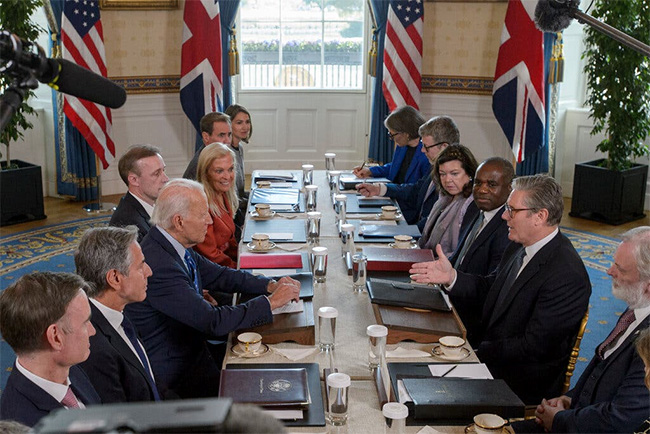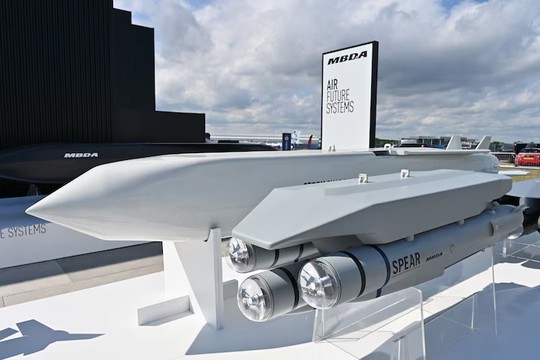British Storm Shadow long range deep strike weapon and a SPEAR, network enabled high precision surface attack missile system.
Photo: Getty Images
President Joe Biden and British Prime Minister Keir Starmer at the White House discussed how far Western allies might be willing to go to help Ukraine, including the possibility of allowing Ukraine to use European-made long-range missiles to strike certain targets deep inside Russia, ABC News reports.
The talks come amid increased tension with Russia as President Vladimir Putin warned that the use of Western weapons to strike Russian targets would be seen as a serious escalation in the war and a direct challenge by NATO nations.
At issue is whether the United States and the United Kingdom might agree to repeated requests by Ukrainian President Volodymyr Zelenskyy to loosen restrictions on the use of Western weapons, specifically Britain's Storm Shadow missiles and the Army Tactical Missile System that can be used to target Russian airfields and other sensitive sites deep inside Russia.
Both U.K. and U.S. officials sought to tamp down speculation that a decision by Biden or a major policy announcement was imminent.
"There is no change to our view on the provision of long-range strike capabilities for Ukraine to use inside Russia, and I wouldn't expect any sort of major announcement in that regard coming out of the discussions – certainly not from our side," said John Kirby, White House national security spokesman.
Biden has been deeply reluctant to allow Ukraine to use sophisticated Western weapon systems to attack Russian targets far from its border with Ukraine. The U.K., meanwhile, has adopted a more lenient point of view that Russian airfields and other sites used to mobilize troops and other assets to attack Ukraine should be fair game for attack.
A British official speaking on condition of anonymity said the focus of the meeting was much broader than any one piece of equipment, with the goal to have an "open" conversation on how to put Ukraine in a good position to defend itself.
Biden this week stoked speculation of a major policy shift when asked about the discussions, at one point telling reporters, "We are working that out right now."
Speaking on condition of anonymity, a US official said the U.S. remains deeply skeptical that a change in policy by the U.S. and U.K. allies could shift the tide in Ukraine. “We’re really not talking about something that’ll have an impact on the battlefield,” the official said of long-range strike missiles.
The US Department of Defense believes that no type of weapon will become a game changer allowing the Kiev government to emerge victorious in the current conflict, Pentagon Press Secretary Patrick Ryder told reporters at a regular briefing.
"I would point you to [Defense] Secretary [Lloyd] Austin's comments at Ramstein [US air base] last week, where he highlighted there is no capability, <…> no silver bullet that is going to enable Ukraine to succeed," he said.
Ryder added that, in Washington’s opinion, Ukraine should focus on employing capabilities currently at its disposal in a way that that gets them a stronger hand at the negotiating table.
 There were a lot of people at the Biden-Starmer talks. It seems that the Americans do not want to make a decision on strikes deep into Russia. Washington decided to hold a meeting with the Englishman in an expanded format, so that there would bе no doubts about Biden’s position that could arise after a one-on-one meeting with Starmer.
There were a lot of people at the Biden-Starmer talks. It seems that the Americans do not want to make a decision on strikes deep into Russia. Washington decided to hold a meeting with the Englishman in an expanded format, so that there would bе no doubts about Biden’s position that could arise after a one-on-one meeting with Starmer.
Photo: The New York Times
Starmer later told the media that the talks were “productive” but concentrated on “strategy” rather than a “particular step or tactic”. He did not signal any decision on allowing Kiev to fire long-range missiles into Russia.
Starmer said no final decision had been taken on the Storm Shadow missiles and hinted that further developments may follow at the gathering of the UN General Assembly later this month. “We’ll obviously pick up again in UNGA in just a few days time with a wider group of individuals,” he said.
One reason for such extreme secrecy is that the US and UK are intensely conscious of the Russian President Vladimir Putin’s explicit warning on Thursday that any use of western long-range missiles to strike Russia “will mean that NATO countries, the United States, and European countries are parties to the war in Ukraine. This will mean their direct involvement in the conflict, and it will clearly change the very essence, the very nature of the conflict dramatically.”
Interestingly, neither Washington nor London has so far refuted Putin’s above explanation and, curiously, it has been expunged altogether from British press reports — fearing, perhaps, that public opinion might militate against such direct involvement by the UK in a war against Russia in a combat role, notes M.K. Bhadrakumar, Indian Ambassador and prominent international observer.
Deputy Foreign Minister Sergey Ryabkov, Moscow’s point person on the diplomatic track, was quoted as saying on Saturday, “The decision has been made, the carte blanche and all indulgences have been given (to Kiev), so we [Russia] are ready for everything. And we will react in a way that will not be pretty.”
Former Russian President Dmitry Medvedev, who now serves as deputy chairman of the country’s security council, went a step further saying that the West is testing Russia’s patience but it is not limitless. He said Ukraine’s invasion already gave Russia formal grounds to use its nuclear arsenal.
Apparently, Biden believes that Russia’s current battlefield dominance is a random phenomenon and possible outcomes range from an annihilation of Russian military power to a large-scale disruption of life in Russia and a possible collapse of Russia — at a minimum, the weakening of the Russian hand in any future negotiations. Simply put, the war is now about Russia rather than Ukraine and long-range missiles can be a game changer.
Thus, Biden, with no political constraints working on him anymore, is escalating the war to create new facts on the ground before his presidency ends in January, which may create conditions for permanent NATO military presence on Ukrainian territory and present Russia with a fait accompli.
Such a strategy built on the quicksands of probability is akin to a game of Russian roulette — an act of bravado. Indeed, Biden’s options to support Ukraine are shrinking with each escalation, As the Wall Street Journal puts it, “With only four months left in the Biden administration and little hope of Congress approving additional funding for Ukraine no matter who wins the presidency, the White House is debating how best to help Kyiv given its limited toolbox.”
The bottom line is that Biden’s war strategy is attenuating as “escalation management” while NATO transitions as a direct party to hostilities, M.K. Bhadrakumar concludes.
read more in our Telegram-channel https://t.me/The_International_Affairs

 11:02 17.09.2024 •
11:02 17.09.2024 •























